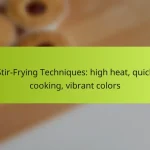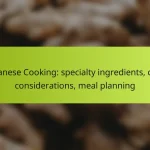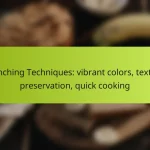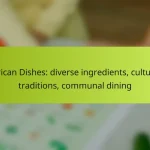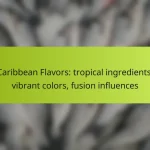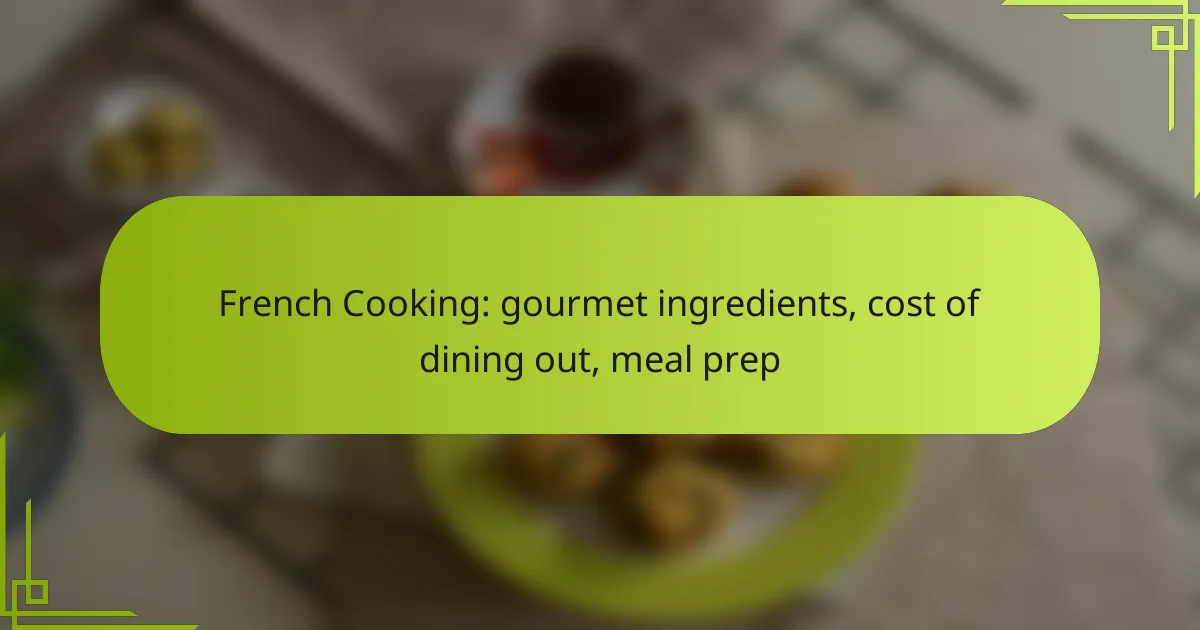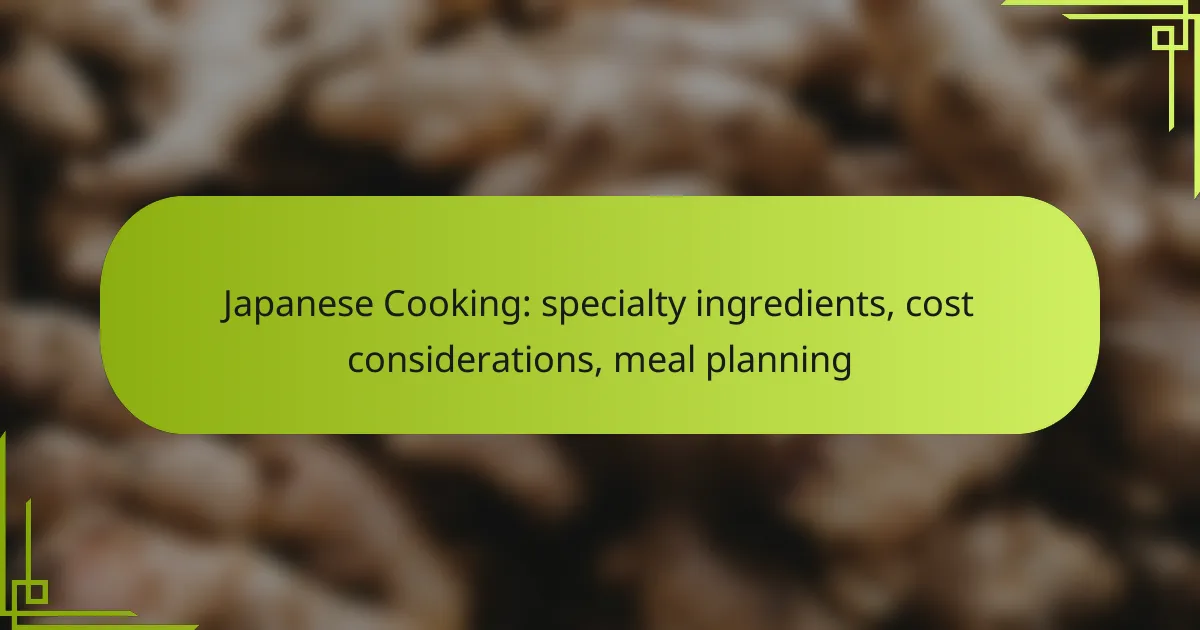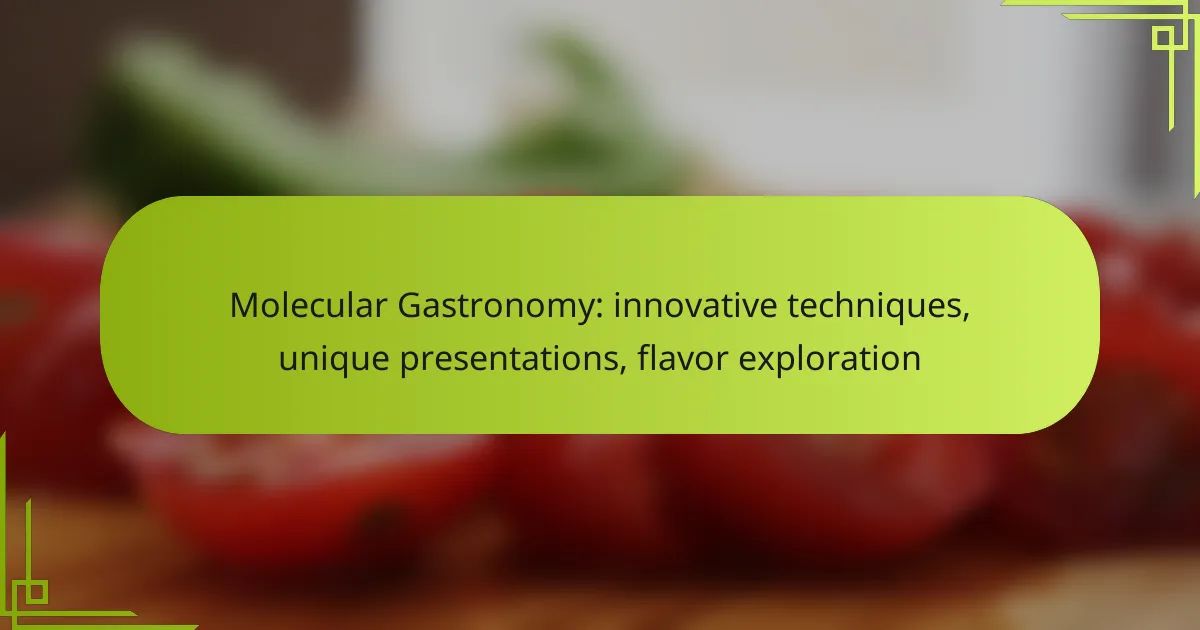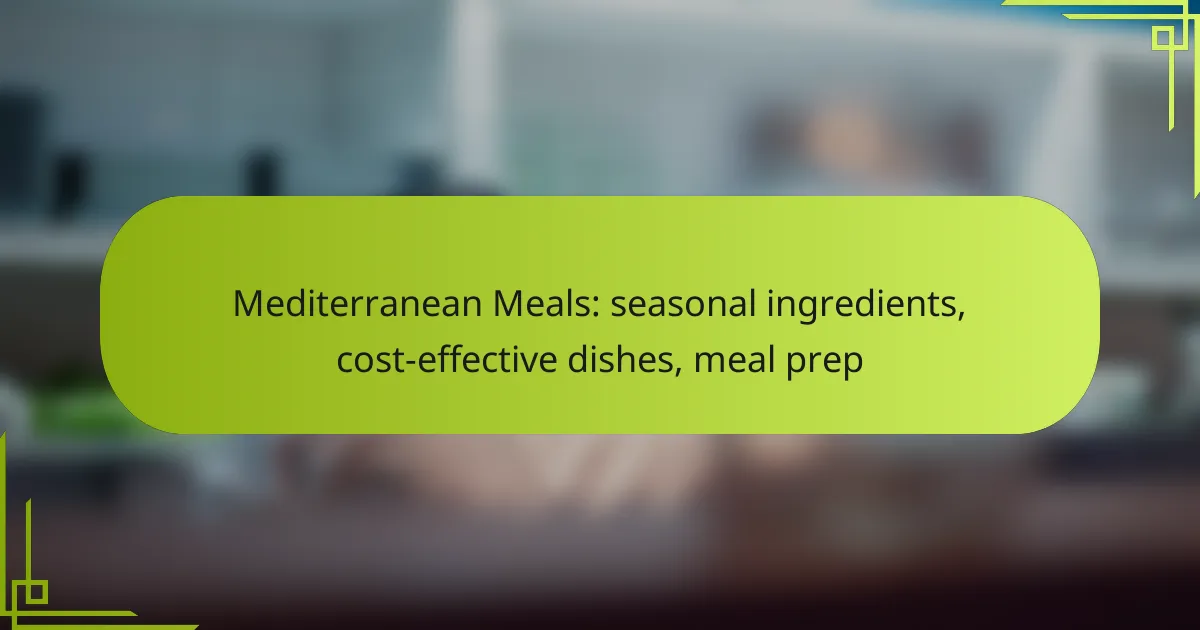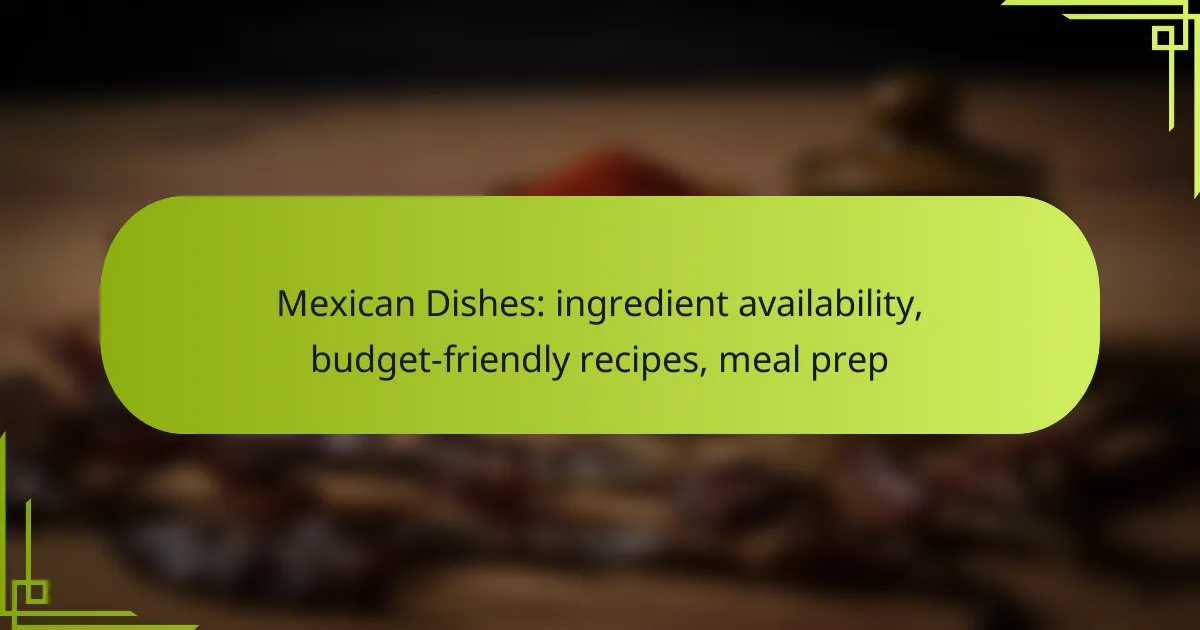French cooking is renowned for its use of gourmet ingredients that enhance flavors and elevate dishes to new heights. While dining out in France can range from affordable to extravagant, understanding meal prep strategies can help you recreate these culinary delights at home. By focusing on classic recipes and seasonal ingredients, you can enjoy the essence of French cuisine without breaking the bank.
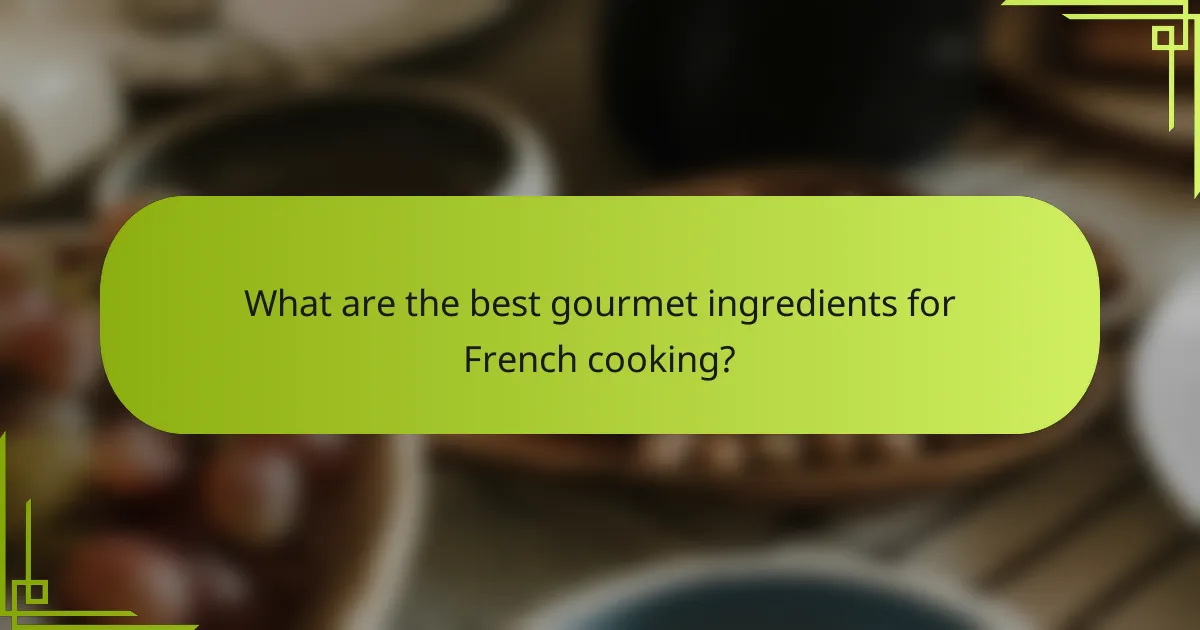
What are the best gourmet ingredients for French cooking?
The best gourmet ingredients for French cooking elevate dishes with rich flavors and textures. Key ingredients include truffle oil, herbs de Provence, duck fat, French sea salt, and foie gras, each contributing unique characteristics to classic recipes.
Truffle oil
Truffle oil is a luxurious finishing oil infused with the essence of truffles, often used to enhance the flavor of dishes. A few drops can transform simple pasta, risottos, or even popcorn into gourmet experiences. When purchasing, look for oils made with real truffles rather than synthetic flavors for the best quality.
Herbs de Provence
Herbs de Provence is a fragrant blend of dried herbs typically including thyme, rosemary, and lavender. This mix is essential for seasoning meats, vegetables, and stews, providing a taste of the French countryside. Use it generously in marinades or sprinkled over roasted dishes to impart a warm, aromatic flavor.
Duck fat
Duck fat is prized for its rich flavor and high smoke point, making it ideal for frying and sautéing. It adds depth to dishes like confit potatoes or roasted vegetables. While it can be more expensive than other cooking fats, a little goes a long way, and its unique taste is worth the investment.
French sea salt
French sea salt, particularly fleur de sel, is harvested from coastal regions and is known for its delicate flavor and flaky texture. It is perfect for finishing dishes, enhancing the natural flavors of meats and vegetables. Use it sparingly to avoid overpowering your meal; a pinch can elevate the overall taste significantly.
Foie gras
Foie gras is a luxurious delicacy made from the liver of a fattened duck or goose, known for its rich, buttery flavor. It can be served as a pâté, mousse, or seared, often paired with sweet accompaniments like fruit preserves. Due to its high cost and ethical considerations, it’s best enjoyed on special occasions or in fine dining settings.
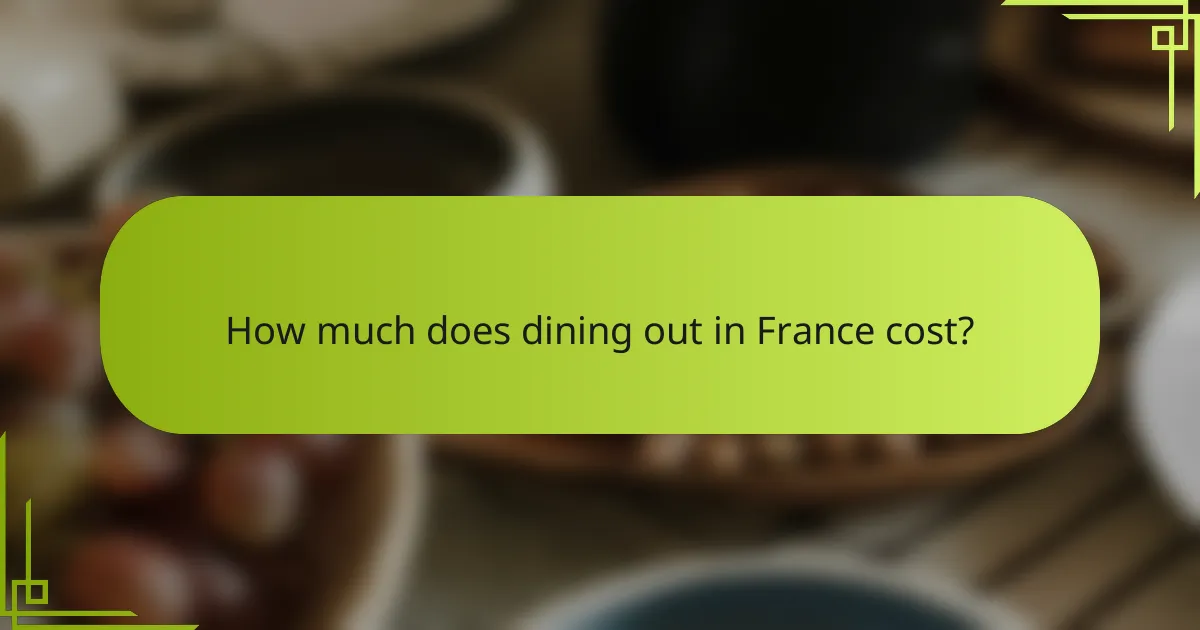
How much does dining out in France cost?
Dining out in France can vary significantly in cost depending on the type of restaurant and location. In general, you can expect to spend anywhere from a modest amount for casual dining to a premium for high-end establishments.
Average meal prices in Paris
In Paris, average meal prices can range from around €15 to €30 for a standard meal at a mid-range restaurant. A three-course meal for two at a nicer establishment typically costs between €60 and €100. Keep in mind that prices can be higher in tourist-heavy areas.
For a quick bite, such as a sandwich or a crepe, you might spend around €5 to €10. Cafés often offer lunch specials that can provide good value for money.
Cost of Michelin-starred restaurants
Many Michelin-starred venues offer tasting menus, which can cost upwards of €150 per person. Reservations are highly recommended, and dress codes may apply, so plan accordingly.
Budget dining options in Lyon
Lyon is famous for its culinary scene, and you can find budget dining options that offer great value. Bouchons, traditional Lyonnais restaurants, often serve hearty meals for around €15 to €25. These establishments provide a cozy atmosphere and authentic local dishes.
Street food and markets are also excellent choices for budget dining. You can enjoy a meal for about €5 to €10 at food stalls or local markets, making it easy to experience the local flavors without breaking the bank.
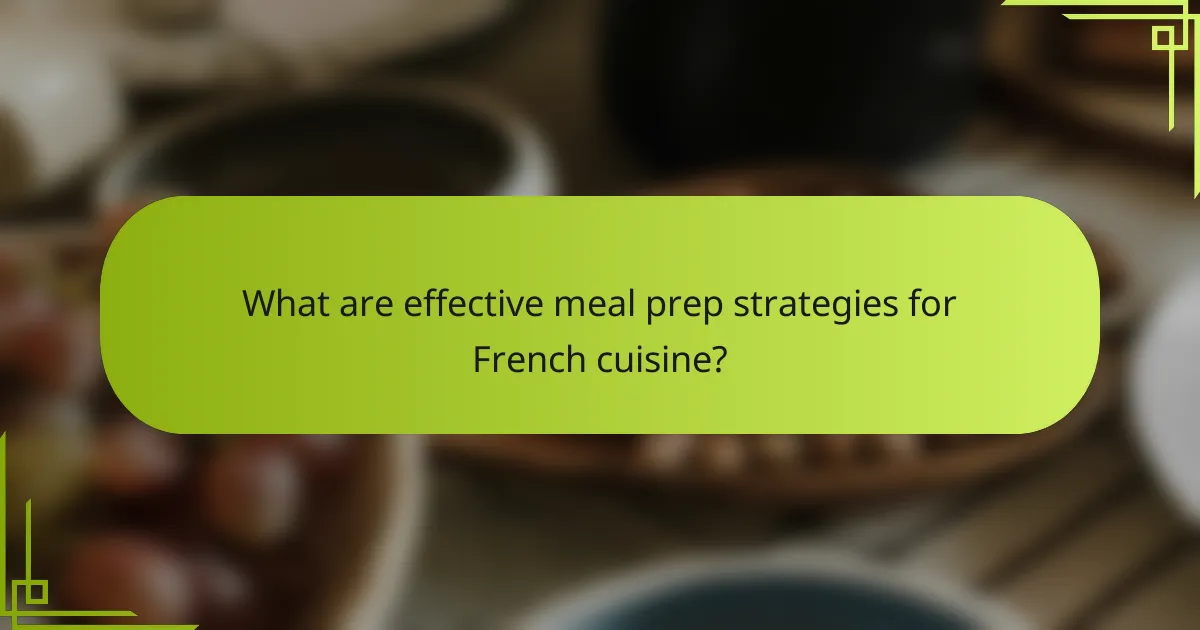
What are effective meal prep strategies for French cuisine?
Effective meal prep strategies for French cuisine focus on planning, utilizing classic recipes, and making the most of seasonal ingredients. By organizing your cooking process, you can save time and enhance the flavors of your dishes.
Batch cooking classic dishes
Batch cooking involves preparing larger quantities of traditional French dishes, such as coq au vin or ratatouille, which can be easily stored and reheated. This method not only saves time but also allows flavors to develop, improving the overall taste.
Consider cooking in bulk on weekends and portioning meals for the week ahead. Use airtight containers to keep dishes fresh, and label them with dates to ensure you consume them within a safe timeframe, typically within three to five days.
Using seasonal ingredients
Incorporating seasonal ingredients into your meal prep enhances the quality and flavor of your French dishes while often reducing costs. Seasonal produce is typically fresher and more affordable, making it a smart choice for meal planning.
Visit local markets to find in-season vegetables and herbs, such as asparagus in spring or root vegetables in winter. This not only supports local farmers but also allows you to create dishes that reflect the current culinary landscape of France.
Storing sauces and stocks
Properly storing sauces and stocks can significantly streamline your French cooking process. Make large batches of foundational sauces like béchamel or stock, which can be frozen in portion-sized containers for future use.
Label your containers with the type of sauce or stock and the date of preparation. Most sauces can be stored in the freezer for up to three months, while stocks can last even longer. This practice ensures you have essential components ready to elevate your meals without starting from scratch each time.
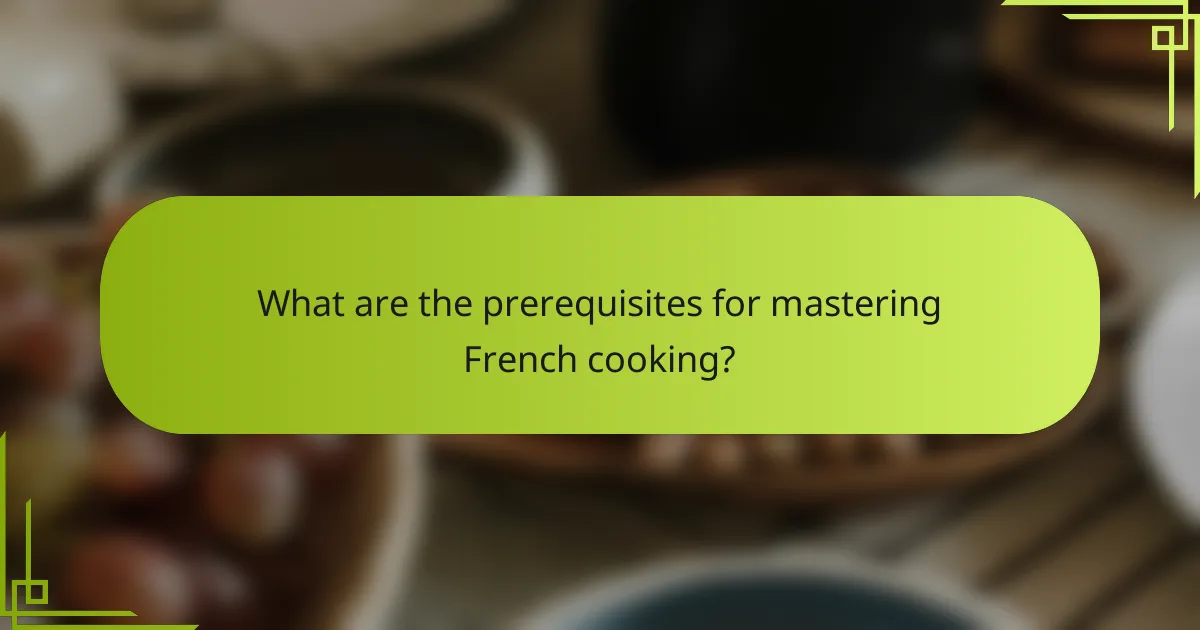
What are the prerequisites for mastering French cooking?
To master French cooking, you need a solid foundation in essential kitchen tools and basic cooking techniques. Understanding these prerequisites will enhance your culinary skills and enable you to create authentic French dishes.
Essential kitchen tools
Having the right kitchen tools is crucial for effective French cooking. Key items include a good chef’s knife, a cutting board, a heavy-bottomed saucepan, and a sauté pan. These tools help ensure precision and consistency in your cooking.
Additionally, consider investing in a mandoline for slicing vegetables, a whisk for emulsifying sauces, and a food processor for efficient ingredient preparation. While you can start with basic tools, gradually upgrading your equipment will improve your cooking experience.
Basic cooking techniques
Mastering basic cooking techniques is vital for anyone looking to excel in French cuisine. Techniques such as sautéing, braising, and poaching form the backbone of many classic French recipes. Each method requires specific skills, like controlling heat and timing, which are essential for achieving the desired flavors and textures.
Practice techniques like making a roux for sauces or perfecting the art of knife skills to enhance your efficiency in the kitchen. Avoid common pitfalls, such as overcrowding the pan when sautéing, which can lead to uneven cooking. Focus on mastering a few techniques at a time to build your confidence and repertoire.
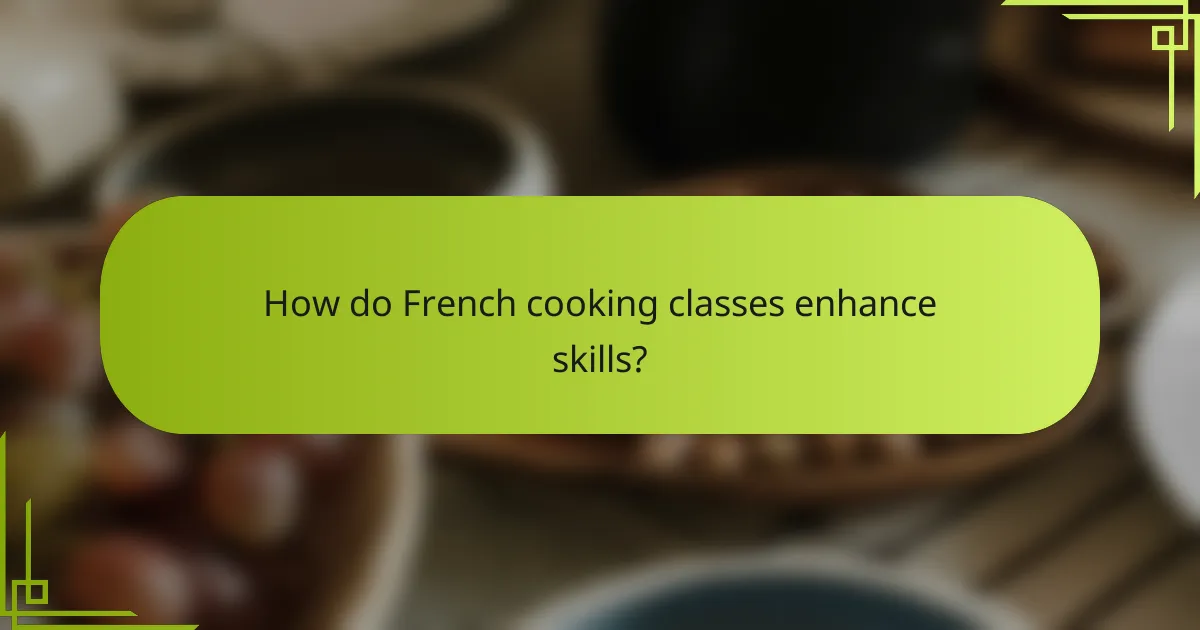
How do French cooking classes enhance skills?
French cooking classes significantly enhance culinary skills by providing practical experience and expert guidance. Participants learn essential techniques, explore gourmet ingredients, and gain confidence in preparing classic French dishes.
Hands-on experience in Paris
Attending a cooking class in Paris offers an immersive experience that combines learning with cultural exploration. Students often shop for fresh ingredients at local markets, which helps them understand the importance of quality and seasonality in French cuisine.
Classes typically involve preparing traditional dishes, allowing participants to practice techniques like sautéing, braising, and pastry making. This hands-on approach reinforces learning and builds muscle memory, essential for mastering culinary skills.
Learning from professional chefs
Learning from professional chefs in French cooking classes provides invaluable insights and tips that are not easily found in cookbooks. Chefs share their expertise on flavor combinations, presentation, and the subtleties of French culinary traditions.
Many classes feature small group sizes, ensuring personalized attention and feedback. This direct interaction allows students to ask questions and receive immediate guidance, which can significantly accelerate their learning process.
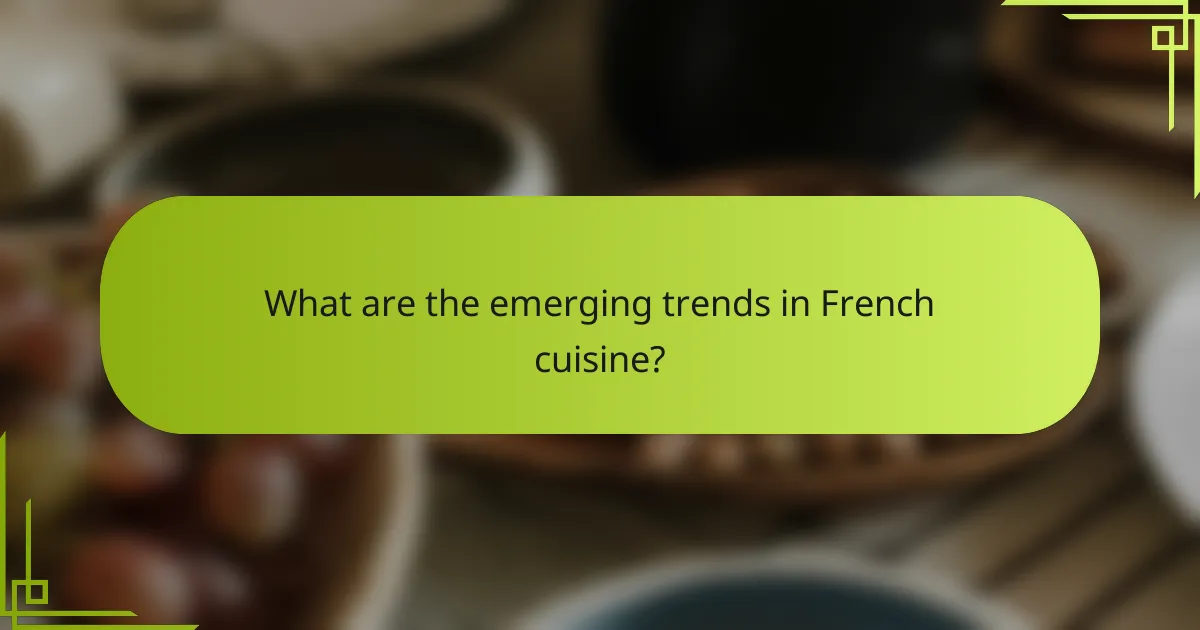
What are the emerging trends in French cuisine?
Emerging trends in French cuisine focus on sustainability, local sourcing, and innovative techniques. Chefs are increasingly incorporating plant-based ingredients and reimagining traditional dishes to appeal to modern palates.
Gourmet ingredients
Gourmet ingredients in French cooking often include high-quality, locally sourced products that enhance flavor and presentation. Items like truffles, foie gras, and artisanal cheeses are commonly used, but there is a growing emphasis on seasonal vegetables and organic produce.
When selecting gourmet ingredients, consider their origin and freshness. For example, sourcing vegetables from local farmers’ markets can provide superior taste and support the community. Prices for these ingredients can vary widely, often ranging from moderate to high, depending on the rarity and quality.
Cost of dining out
The cost of dining out in France can vary significantly based on location and type of establishment. In major cities like Paris, a meal at a mid-range restaurant can cost around €20 to €50 per person, while fine dining experiences may exceed €100.
To manage dining expenses, consider visiting bistros or brasseries, which often offer quality meals at lower prices compared to high-end restaurants. Lunch menus are typically more affordable, providing a great opportunity to enjoy gourmet cuisine without overspending.
Meal prep
Meal prep in French cooking involves planning and preparing dishes in advance to save time and enhance flavor. This method allows for the use of fresh ingredients and can help streamline the cooking process during busy weeks.
To effectively meal prep, choose recipes that hold up well over time, such as stews or casseroles. Aim to prepare meals in batches, storing them in airtight containers. This approach not only reduces food waste but also ensures you have gourmet options readily available throughout the week.
